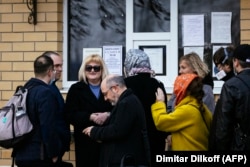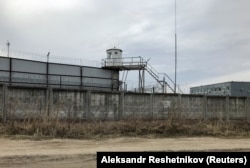Amidst an international outcry over reports of jailed Russian opposition leader Aleksei Navalny’s deteriorating health, Moscow is now embroiled in yet another struggle over a constitutional right -- this time, to health care.
Article 41 of Russia’s constitution guarantees each citizen “the right to health care and medical assistance.” But it does not specify what kind or quality or by whose choice.
As the U.S. warns that Russia will face “consequences” if Navalny, the victim of a 2020 poisoning attempt, dies and the European Union’s 27 foreign ministers holding Russia “responsible for his safety,” the answer to that question could prove critical for this sanctions-hit country.
Citing prison laboratory test results, Navalny’s personal physicians and lawyers insist that the 44-year-old blogger-activist, on a hunger strike since March 31 over allegedly inadequate medical care, is now close to death.
Nearly 465,409 of his supporters, according to the Free.Navalny website, plan to stage protests in 117 towns throughout Russia on the evening of April 21 for him to receive access to his own physicians.
To date, the Federal Penitentiary Service (FSIN) has denied those demands.
On April 18, as international media coverage of Navalny’s health intensified, however, it moved Navalny from the IK-2 prison in the Vladimir Oblast town of Pokrov to the hospital for the IK-3 penal colony in the regional seat, Vladimir, about 186 kilometers northeast of Moscow.
Navalny lawyer Aleksei Liptser, who saw his client for several minutes in the IK-3 prison hospital after hours of waiting, described him to Current Time as in “rather a sad condition.”
Navalny has plainly lost weight, is weak, and constantly coughs, Liptser elaborated.
On April 20, Navalny’s personal physicians were again denied access to him. Dr. Anastasia Vasilyeva, head of the Alliance of Doctors union and an outspoken Kremlin critic, tweeted that the refusal displayed “disrespect and mockery” toward the doctors, and posed a “clear threat” to Navalny’s life.
“This is totally not a hospital where they can diagnose and treat his problems,” Vasiliyeva asserted on Twitter the previous day.
Inside IK-3
The 379-bed IK-3 prison hospital is primarily known for its treatment of tuberculosis, for which it contains three departments. It also contains physical therapy, surgical, and psychiatric departments, according to the state news agency RIA Novosti.
Although he reportedly has congestion and a fever, prison staff have not stated whether or not Navalny has been diagnosed with tuberculosis, a common malady in Russian prisons.
Navalny has claimed that three of 15 prisoners from his section at IK-2 contracted the disease.
Cardiologist Yaroslav Ashikhman, another Navalny physician, believes, though, that treatment in a prison hospital is “always” better than within a penal colony.
High levels of potassium, creatinine (a waste product), and uric acid (a urine component) in Navalny’s April blood-test results could lead to cardiac arrest or “life-threatening” ventricular tachycardia (an abnormally rapid heart rate),as well as kidney failure, Ashikhman said. IK-3 "at least" has a defibrillator to prevent cardiac emergencies, he added.
Navalny himself also has reported “severe pain in the legs that cannot be relieved” and “numbness and burning in the hands.”
Ashikhman stated that he knew of “no complete diagnostic concept” by prison doctors that addresses these problems.
“So, all of this is an extremely worrisome condition, extremely dangerous, potentially,” he said on April 19.
Another of Navalny’s physicians, Dr. Andrei Erlich, an intensive-care specialist at Moscow’s Bauman City Hospital No.29, noted that the politician’s test results, likely linked to his hunger strike, would prompt a repeat of the tests “in any normal medical establishment” to confirm the findings.
“The fact that they didn’t repeat them in the FSIN actually speaks about the level of medicine in the FSIN …” scoffed Erlikh.
Upon Navalny’s admission to the IK-3 prison hospital, the Vladimir Oblast FSIN stated only that his health status was “satisfactory.”
It described the hospital as “specializing in the dynamic observation of similar patients.” A “doctor-therapist” daily examines the activist, who has agreed to undergo vitamin therapy, the regional FSIN stated on April 19.
No mention was made of repeating Navalny’s bloodwork, which IK-3 can analyze on site.
Under Russian law, however, so long as a prisoner has not exhausted the penal system’s options for medical care, prison officials will not allow assistance from a civilian doctor, noted Asmik Novikova, the manager of investigations for Public Verdict, a non-governmental watchdog for human-rights violations by Russian police.
The prisoner must prove that he cannot receive the necessary medical care inside the prison, Novikova added.
Usually, however, “there are no obstacles” if a prisoner can independently pay for his or her own medical treatment, she said.
As of April 7, however, she claimed that the FSIN is “not doing anything” to explain what needs to be done for Navalny to receive such care.
The FSIN does not appear to have responded to this allegation or to an open letter from four Navalny doctors, including Ashikhman, Erlich, and Vasilyeva demanding access to their patient.
But pro-government media have attempted to push back against claims of medical mistreatment of Navalny.
On April 19, the daily Izvestia, citing an anonymous source in the regional FSIN administration, reported that private physicians had, in fact, visited Navalny before his transfer to IK-3.
The unidentified source listed them as a therapist, a neurosurgeon, a neurologist, a dietologist, and a psychiatrist. An MRI scan and ultrasound – conceivably, of Navalny’s limbs or spine – and an electrocardiogram were supposedly performed.
No names or dates of the visit/s were provided.
On social media, Navalny supporters continue to state that no civilian physician has seen the politician.
A Prison Hospital The Dying Try To Avoid?
Aside from medical care, some independent investigative media outlets have focused on another alleged aspect of the IK-3 prison hospital’s practices.
In a 2020 report on torture in Russia’s prison system, Proyekt (Project) identified IK-3 as among the prisons that give Vladimir Oblast one of the country’s highest rates of prison brutality.
The prison hospital has such a “terrifying” reputation for alleged torture and murders that some Vladimir Oblast prisoners have slit their veins to avoid being sent there, IStories claimed in an April 9 overview of the region’s prison system.
“Even the dying try not to end up in this hospital,” claimed ex-convict Dmitry Demushkin, who served time in Pokrov’s IK-2 prison.
In a 2018 interview with the state news agency RIA Novosti, however, the then deputy head of Vladimir Oblast’s penal medical facilities, Colonel Natalya Koshokina, described a hospital that strictly follows the rules.
“Yes, this is no [Young] Pioneers camp,” Koshokina said, in reference to the Soviet Communist Party’s youth group. “That’s for sure.”
Koshokina did not address torture or murder allegations, but conceded that not all doctors can work in IK-3 – for fear of the prisoners, she said.
She emphasized that an inspector attends any appointment and that metal bars separate prisoners and physicians.
That likely comes as no reassurance to FSIN’s critics.
But firing up broad-based support for their position appears to be an ongoing challenge.
'Let Them Follow The Laws'
Officials have warned that no unauthorized rallies for Navalny will be allowed on April 21. [Current Time will cover the protests beginning at 6 p.m., Moscow time.]
As yet, no such rally has been announced for Pokrov, the site of Navalny’s former prison.
Residents interviewed there by Current Time on April 13 appeared divided about whether or not Navalny should have the right to see his own doctors.
“I don’t respect people like Navalny,” remarked one elderly woman sitting on a public bench. “And the fact that he’s starving – well, let him starve!”
But one bald, middle-aged man in a neon-green sports jacket contended that Navalny is in prison because he is a politically active opposition member.
“Let them follow the laws” toward Navalny, the man said of prison officials.
Article 41 of the Russian constitution, he stressed, “gives him the right to treatment.”








